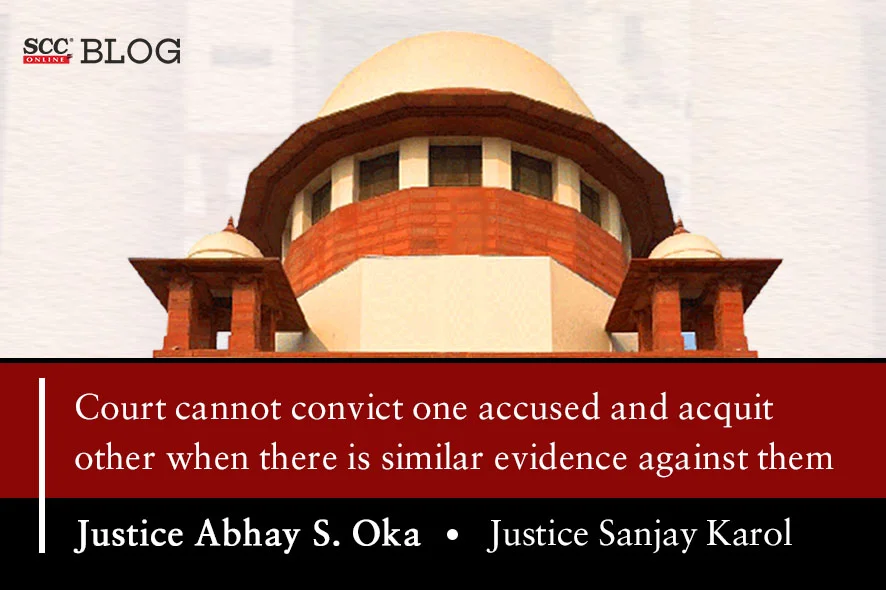Supreme Court: In an appeal filed by a convict against the judgment passed by the Gujarat High Court, wherein the Court convicted some of the accused, while acquitting others in a case, the division bench of Abhay S. Oka* and Sanjay Karol, JJ. has acquitted the convict by setting aside the judgment of the Trial Court and the impugned judgment of the High Court. Further, it acquitted other 3 convicts, by suo motu exercising its powers under Article 136 of the Constitution of India and extended the benefit of parity to these convicts who did not challenge the judgment of the High Court.
Background:
Thousands of people had gathered in the Shah Alam area of the city of Ahmedabad. When the witness 1 was passing through that area by his two wheeler, the crowd stopped him. He was forced to disclose his identity. After he disclosed his identity, the crowd started assaulting him and his two-wheeler was burnt. Thereafter, the crowd stopped an autorickshaw, and the passengers in the autorickshaw were forced to alight. The necklace of witness 2, who was a passenger in the auto rickshaw, was snatched. The mob assaulted witness 3 who was carrying LPG cylinders on a bicycle. Another witness was passing through that area on his two-wheeler with the deceased as a pillion rider. The mob assaulted the deceased. Afterwards, the dead body of the deceased was found in a nearby lake.
A total of 13 accused were prosecuted, out of which seven accused were convicted, including the present appellant/ convict, for the offences punishable under Section 396, Section 395, Section 307, Section 435 read with Section 149 and Section 201 of the Penal Code, 1860 (‘IPC’). The maximum sentence imposed was life imprisonment for the offence punishable under Section 396 read with 149 IPC. By the impugned judgment, while confirming the conviction of the accused, the High Court brought the sentence down to 10 years. The appeals preferred by the convict were decided by a Division Bench of the High Court by the impugned judgment. Thereafter convicts 6, 1, 5 and 13 preferred appeals to this Court, wherein the Court acquitted the convicts 1, 5 and 13. Thus, the convict in question i.e. convict 6 filed the present appeal.
Analysis:
The Court noted here that no other prosecution witnesses other than witness 2 has identified convict 6. She stated that a mob of around 50 -100 people had gathered around the autorickshaw. The Court said that there was no time available to her to observe the distinctive features of convict 6. The incident of snatching must have been over in seconds. Therefore, it is very difficult to accept that in such a large mob gathered around the autorickshaw, the witness 2 could remember the face of only one accused and recognise him after a lapse of about two years from the date of the incident.
The Court said that even when the conviction can be based on the testimony of only one eyewitness, but the testimony of witness 2 is not wholly reliable. The identification of convict 6 for the first time in the Court after a lapse of about two years becomes doubtful for more than one reason.
-
Convict 6 was not known to witness 2.
-
He was part of a large aggressive mob of 50 to 100 people which surrounded the autorickshaw.
-
There was no identification parade held.
-
There was no time available to witness 2 to note the distinctive features of the convict 6.
Hence, the Court said that it is unsafe to record a conclusion based only on the testimony of the solitary witness that the guilt of convict 6 was proved beyond a reasonable doubt. Even if the evidence of witness 2 is categorised as “neither wholly reliable nor wholly unreliable,” the convict 6 cannot be convicted only based on the sole testimony unless there is a corroboration to the version either by direct or circumstantial evidence. Such corroboration is completely absent in this case. Therefore, the Court held that the conviction of convict 6 cannot be sustained.
The Court viewed that evidence of witnesses does not inspire confidence, thus rejected their testimony in its entirety. Further, it said that the benefit of this finding must be extended to other convicts also.
The Court said that when there is similar or identical evidence of eyewitnesses against two accused by ascribing them the same or similar role, the Court cannot convict one accused and acquit the other. In such a case, the cases of both the accused will be governed by the principle of parity. Which means that the Criminal Court should decide like cases alike, and in such cases, the Court cannot make a distinction between the two accused, which will amount to discrimination.
Thus, the Court suo motu exercised its powers under Article
The Court noted that a special leave petition filed by convict 2 was summarily dismissed without recording any reasons. Further, it reiterated that the order refusing special leave to appeal by a nonspeaking order does not attract the doctrine of merger. However, it said that as a Constitutional Court it is entrusted with the duty of upholding fundamental rights guaranteed under the Constitution. Thus, the Court extended the benefit of parity to the convict 2 and recalled the order passed in the special leave petition filed by him.
Thus, the Court acquitted convict 2,3,4 and 6.
[Javed Shaukat Ali Qureshi v. State of Gujarat, 2023 SCC OnLine SC 1155 , decided on 13-09-2023]
*Judgment Authored by: Justice Abhay S. Oka









